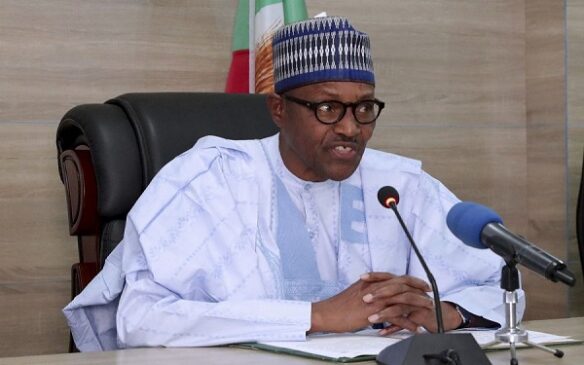Growth: Experts Task FG on Private Sector Driven Economic Policies
To strengthen the nation’s economic growth trajectory, experts have asked the Federal Government to development private sector driven policies and create enable business environment for local businesses to thrive.
Following the outbreak of coronavirus, the nation’s gross domestic growth has been projected to be negative due to reduce economic activities in the first half of 2020.
In its macroeconomic note, Cowry Asset limited said that the recent unemployment rate data reflects ineffectiveness of the government at creating enable environment for businesses to thrive.

Lower sentiment on the economy is bearing upon investment pattern, in its first half report, the Nigerian Stock Exchange notified that foreign portfolio investment dropped by 40%.
Analysts said the Nigerian economy is suffering from multiple fronts due to lack of supportive private sector led policies that drive investment.
Due to weak global economic condition, joblessness has increased to a very steep level but policies makers are re-strategising with strong private-sector-led investment policies.
Consultants at LSintelligence Associates attribute the steep unemployment rate to lower productivity.
In an email, the firm said economic temperature has been weak as quiet a number of companies have been operating below full capacity since 2019.
LSintelligence stated further the issue of lower productivity could be traced to lower purchasing power, rising inflation and of course, the coronavirus pandemic.
With low foreign receipt, follows by increased public debt, foreign investors have remained on the sideline of the economy, with marginal play at the fixed income market.
Analysts noted that demand for government instrument remains high despite the fact that rates are ridiculously low.
The stock market has not also been anything better with both local and foreign investors losing significant chunk of the funds to bearish trend.
Total foreign portfolio reduced, just as Nigerian Autonomous Foreign Exchange Rate lifted closed at N386.75 in June, 2020.
Analysts said foreign portfolio inflow dropped by about 40% due to weak market sentiments and scarcity of foreign exchange.
FX scarcity has kept foreigner glue in the financial market as they are unable to repatriate funds home with the apex back carrying backlogs of dollar demand.
The situation has resulted to low foreign investment sentiment towards the Nigerian economy in the 2020 couple with the outbreak of coronavirus which exacerbate the situation.
Experts at Cowry Asset tasks government to promulgate policies that would support private-sector-led investments.
It noted that unemployment rate which settled at 27.1% in the second quarter of the year reflects government ineffectiveness at creating enable environment for businesses to thrive.
The recent data released by the National Bureau of Statistics (NBS) for the second quarter (Q2) 2020 on labour force showed labour force dropped to 80.29 million which is 11.25% down from 90.47 million in Q3 2018.
Further breakdown of the data showed that, unemployment rate rose to 27.1% in Q2 2020 from 23.1% in Q3 2018 as the classification of those working less than 20 hours a week and those who did nothing together increased the number of unemployed persons to 21.76 million.
This is against 20.93 million recorded in Q3 2018.
Also, 22.94 million persons were underemployed, as they worked less than 40 hours, in Q2 2020 which is 25.97% up from 18.21 million in Q3 2018).
This brought the total unemployed plus underemployed persons to 44.71 million (55.68%) in Q2 2020 from 39.14 million (43.27%) in Q3 2018.
Amongst the 36 states and Federal Capital Territory, five states with the highest unemployment were Imo State 75.1%, Kaduna 72.8%, Abia 70.3%, Kogi 69.1% and Gombe 69.1%.
Meanwhile, 44.32% of the labour force who worked for more than 40 hours (the fully employed), fell to 35.59 million in Q2 2020 from 51.32 million in Q3 2018.
Read Also: FBNH: We Want To Regain Our Leadership in Banking Sector – GMD
Analysts said report from NSE on domestic and foreign portfolio participation in equities trading showed that total equities market transactions decreased in the first half (H1) 2020 compared to transactions done in the corresponding period of 2019.
The ratio of total domestic transactions to total foreign transactions increased to 60:40 in H1 2020, from 54:46 in the comparable period in 2019 given the marginal 1.27% decline in total domestic transactions as compared with the 16.11% fall in total foreign portfolio transactions.
Specifically, total transactions on the nation’s bourse moderated to N1.00 trillion in H1 2020 from N1.09 trillion printed in H1 2019; of which total domestic transactions fell to N606.93 billion from N614.73 billion.
Cowry Asset stated that FPI transactions reduced to N396.63 billion from N472.78 billion.
Breakdown of the FPI transactions in H1 2020 showed that foreign portfolio outflows increased by 3.44% to N266.68 billion.
However, the foreign portfolio inflows dropped by 39.55% to N129.95 billion amid uncertainties over the COVID-19 pandemic.
However, domestic institutional transactions rose year on year by 12.45% to N320.52 billion in H1 2020.
On the flip side, retail investors’ interest in equities market was weak as transactions from this group moderated to N286.41 billion in the period under review from N329.69 billion in H1 2019.
Analysts said as investors stood on the side lines, particularly the FPIs, the NSE All Share Index (ASI) plummeted by 8.80% to 24,479.16 index points in H1 2020 compared to the 4.66% decline to 29,966.87 index points in H1 2019.
“The un-encouraging unemployment figures reflects the ineffectiveness of government at creating an enabling environment for private businesses to thrive and absorb the capable and willing to work persons; hence the rising poverty and worsening insecurity.
“We expect government to continue prioritising infrastructural development and churning out right policies that would facilitate private-sector-led investments”, Cowry Asset stated.
Growth: Experts Task FG on Private Sector Driven Economic Policies












